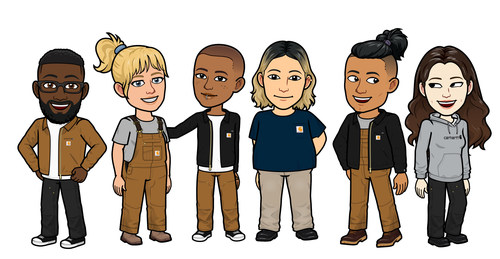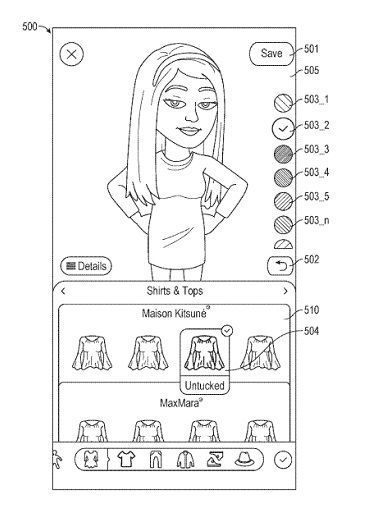While Meta continues to work on advanced VR interaction, with a view to hosting the next stage of digital connection, Snapchat is charting its own path in building towards the metaverse future, which may or may not be owned by Zuck and team.
Aside from developing its own AR tools, a field in which it remains a leading presence, Snap is also building more advanced avatar options through its popular Bitmoji platform, which has enabled users to create digital likenesses of themselves since 2007.
The latest advance on this front is Bitmoji fashion, with a range of well-known brands signing on to create digital replicas of their products, that users can then dress their Bitmoji characters in.
The latest brand to sign up for this is Carhartt, which has partnered with Snap on a new range of Bitmoji items.

As per Carhartt:
“Inspired by Carhartt’s most popular men and women styles, the new digital offering enables Snapchat and Bitmoji users everywhere to authentically represent themselves in the digital world through a variety of products and colors. The digital attire includes the brand’s iconic Detroit Jacket, K87 Short Sleeve Pocket T-shirt, Force Sweatshirt, BO1 Double Front Pants and Duck Bib Overalls.”
Carhartt joins a growing list of top brands building their own Bitmoji fashion collections, with Adidas, Converse, Nike, Jordan, Crocs, Levi’s, American Eagle, Off-White, Vans, Nickelodeon and Ralph Lauren all now hosting official Bitmoji item sets, providing expanded branding potential for their products, while also giving Bitmoji users more customizable options for their in-app depictions.
Which looks set to be a key trend in the coming metaverse shift. Part of the recent NFT boom links into the concept of ‘digital identity’, with many viewing their cartoonish profile pictures as a new form of personalization and expression, which will eventually translate into equivalent avatars and depictions for them to use in the eventual metaverse environment.
That’s looking less likely, at least from an NFT perspective, as NFT sales continue to plummet. But the concept that people will want to create unique digital characters to represent their personality in this new space is definitely set to be a major trend, as we’ve already seen this in our early examples of what metaverse interaction might look like.
The current proxies we have for the broader metaverse vision are gaming worlds, like Roblox and Fortnite, both of which generate significant income from sales of in-game skins. In fact, Minecraft has built a whole creator economy around custom character and feature designs, with users looking to edit and personalize their in-game depictions in order to better stand out from the crowd, with elements based on achievements, expense, rarity, etc.
Eventually, if all goes as planned, we’ll see similar trends in the metaverse as well – though its less likely to involve Bored Apes, and more likely to facilitate interactive customization, in a broad range of ways, which will also provide all new branding opportunities through sponsored collections, like these Bitmoji offerings.
And that’ll also, eventually, lead to direct sales of digital clothing, which is the next stage of Snapchat’s vision.
Back in 2020, Snap filed a patent which outlined how its Bitmoji fashion process would eventually see Snap partner with a range of fashion retailers to provide Bitmoji versions of their items. That would then provide a heap of new clothing options for your avatar in the app, while also giving the brands new opportunities to showcase their latest products in an engaging, interactive way.

The dual benefit of online and real world product sales is an enticing allure, and will no doubt become increasingly popular as we move closer to the metaverse future.
But then again, there’s also a question of whether Bitmoji characters will even be able to make the leap into the metaverse, and whether you’ll be able to use the same digital avatars across various apps and platforms.
That’s the ideal vision for the metaverse future, where universal schemas will enable anybody to build avatars that can be used across Meta, Snapchat, Fortnite, Minecraft, etc. That would then mean that the character you build in one app will become your digital representation in all worlds.
It’s an ambitious undertaking, which requires a lot of agreement to make it work – but eventually, it could be that your Bitmoji caricature does, in fact, become your universal avatar across all apps.
At least, that’s what Snap is building towards, which could facilitate all new promotion and product showcase opportunities.



